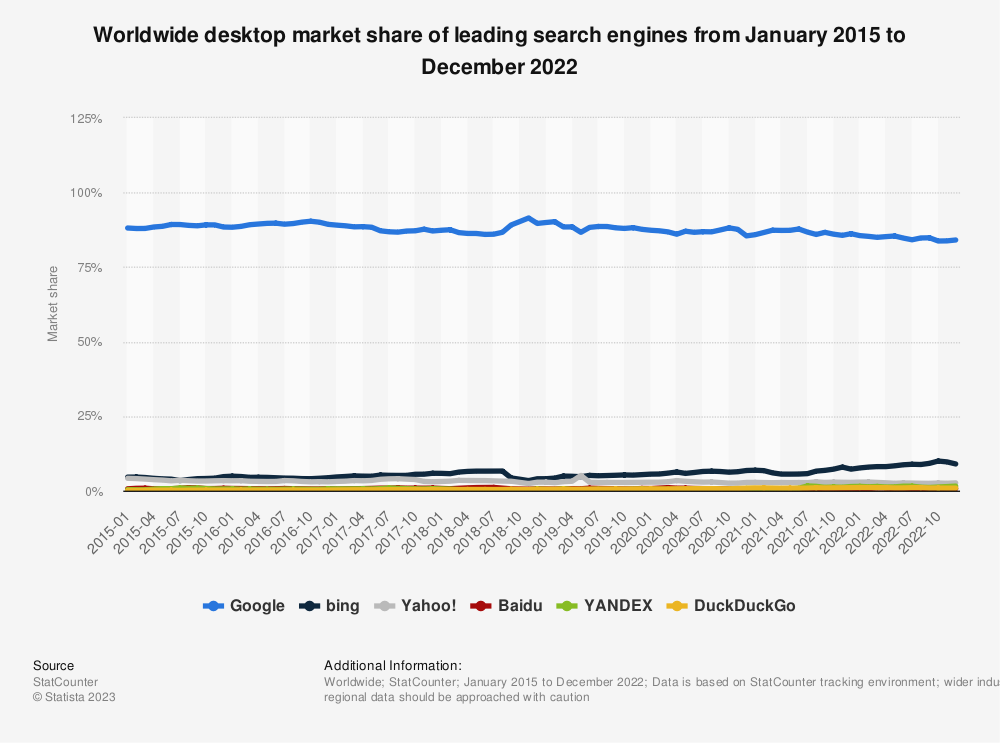With a reported 4% ish market share, vs Google’s 92% the answer is probably still no.
With all the hoopla surrounding Chat GPT and the Microsoft Bing integration, we think it may be wise to revisit Bing SEO, just to keep it on the radar.
Jump to:
- Bing Market Share (Q4 2022)
- Reasons to Revisit Bing SEO
- How we can hep with Bing SEO
- A Brief History of Bing

Bing Market Share for Search
The market share for Bing remains under 10% which puts it in second place for search engines, but far far behind the dominance of Google.

It is has been quite along time since we’ve seen so much ‘buzz for Bing’ and whilst it may be short lived, it may be worth refreshing your memory, and presence on the search engine.

Reasons to Revisit Bing SEO
- Despite the smaller audience, our clients often see higher conversion rates form Bing traffic than from comparable Google traffic.
- With the connection to Chat GPT, this renewed interest in Bing could offer new routes or new opportunities for organic search, like search queries within Microsoft Office.
- Could it be possible that Bing will see a noticeable uplift in traffic that could be worth harnessing?
Optimising for Bing
Optimising for Bing SEO may require a different focus or weighting on certain ranking factors we are used to. However, the foundations of quality, relevant content – presented on fast and mobile friendly platform will remain at the core of any Bing SEO.
Bing places a greater emphasis on social signals and multimedia content, as evidenced by its rich homepage that features more multimedia content than Google’s clean homepage design.

Connecting to the Bing Webmasters tool is a valuable way to benchmark how Bing is indexing and ranking your content. Although the platform is not as advanced as Google Search Console, it’s still a valuable resource for understanding how the world’s second-largest search engine is treating your content.

Bing provides several helpful factors to keep in mind when optimizing your website for their search engine. These include creating clear, unique, high-quality, and relevant content that provides value to users. Avoid thin content, affiliate links, and ads that redirect visitors away from your site. Use original images and videos that are relevant to your content and include descriptive titles, filenames, and text. Optimize your images and videos to improve page load times and accessibility, and avoid embedding important text within images or videos. Finally, make your content discoverable and easy to navigate by testing for usability and avoiding Flash or JavaScript.
How we can help with Bing SEO
As an SEO Consultancy, we constantly monitor all the organic search opportunities. With such a small, and static, market share Bing SEO has always been lower on the priority list. However, we do recommend a continued monitoring of Bing performance from Webmasters and within the organic search reports of Google Analytics.
If Bing is your thing, then we should talk about how it can be harnessed as part of your wider SEO strategy.
A Brief History of Bing
Bing is a search engine developed by Microsoft and launched in 2009 as a successor to MSN Search and Live Search. The development of Bing was part of a larger effort by Microsoft to improve its search capabilities and compete more effectively with Google, which dominated the search market at the time.
The name “Bing” was chosen for its short, memorable, and easy-to-spell nature. Microsoft also aimed to create a brand that was playful and approachable, in contrast to the more technical and serious brand of its previous search engine products.
Bing does feel like another in the list of ‘late to the party’ releases from the Seattle giant. The original Internet Explorer browser was not launched until 1995 at a time when I, and most other Internet users (admittedly a smaller number back then!) were happily using Netscape and Opera.
Bing’s launch was accompanied by a large-scale marketing campaign, including a $100 million advertising budget and a partnership with Yahoo to power its search results. In the years following its launch, Bing introduced several new features and enhancements, such as a “decision engine” that aimed to provide more relevant search results by understanding user intent.
Despite these efforts, Bing has struggled to gain significant market share from Google, which remains the dominant search engine in most regions. However, Bing has still managed to establish itself as a viable alternative to Google, with a reported 9.74% share of the global search market as of 2021.
In recent years, Bing has continued to evolve and expand its offerings, introducing new features such as visual search, intelligent answers, and personalized recommendations. Microsoft has also integrated Bing with its other products and services, such as Windows and Office, to provide a more seamless and integrated user experience.

